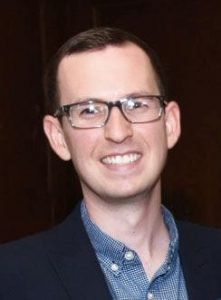Nanotechnology at Northwestern
Meet Leighton Jones, a postdoctoral fellow in the Schatz Group
July 10, 2020
Leighton Jones is a postdoctoral fellow in the Schatz Group, whose research involves theory and computation as applied to problems in nanotechnology, properties of materials, and related areas.
He is originally from England and completed his PhD at the University of Leeds.

When did you first become interested in chemistry?
I’ve always been interested in science, but didn’t make the decision to do chemistry as a profession until half way through college at the age of 17 (in the UK, the college system is a prerequisite 2-year step before undergraduate classes at University). I had yet to learn chemistry is the ‘central science’, so was fortunate to choose a broad subject which I found much interest in.
How do you explain what you study to non-scientists?
Although the theoretical description is mostly confined to ‘calculations on computers’, it is easier to explain their applications. I use real-world examples that people can relate to, with food and outdoor activities serving as good templates. People may have no understanding of what atoms or molecules are, but they can appreciate how the stacking structure of a tandem solar cell relates to a sandwich or a terrine, while the kinetic and thermodynamic pathways of a reaction can be likened to hiking, in the attempt to conjure visions of mountains and valleys akin to energy landscapes.
What are some potential applications for your work?
My work is largely application-driven. The fundamental structure-property relationships I study are focused on areas such as organic photovoltaics for solar energy harvesting, semiconductors for molecular junctions, and catalysis for refinement/conversion of new fuels, among others.
What has been a highlight of your time at Northwestern?
The best part of my time at Northwestern is working with so many amazing people, while engaging with advanced research topics.
What has been the most challenging aspect of your work or your time here?
Familiarizing myself with the insurance and tax system here. A less serious aspect is the hot summers.
Can you tell me about your experiences either being mentored or mentoring others as a scientist?
Mark Ratner and George Schatz have provided outstanding support and mentoring, along with Martin Mosquera and Bo Fu.
What are your hobbies outside of the lab?
International traveling, music and art. Previously enjoyed a Vivaldi performance at the CSO with friends and more recently, Brahms.